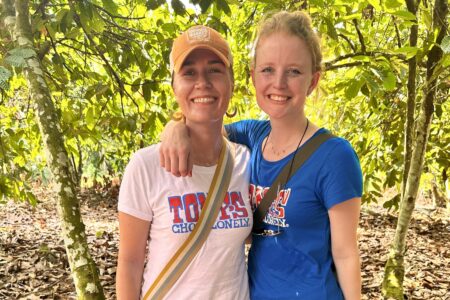Mars announces actions toward deforestation-free cocoa supply chain

Mars Wrigley last week launched new commitments to preserve the planet’s forests, following the release of the company’s strategy to drive towards a sustainable, fully traceable cocoa supply chain by 2025.
John Ament, global cocoa vice president at Mars Wrigley Confectionery, said; “Our Cocoa for Generations plan embodies our sustainability strategy for cocoa, with protecting people and the planet at its core. This announcement shares our success so far – we have already traced a quarter of our global supply chain. In order to achieve our 2025 ambition of a deforestation-free cocoa supply chain for cocoa we source, we will ensure 100% traceability, and will only work with cocoa supply chain partners who can meet our Responsible Cocoa specifications.
“We are proud to share our actions to preserve and protect forests for the future, because the world we want tomorrow starts with how we do business today.”
Janet Ranganathan, vice president, science & research at World Resources Institute said: “I commend Mars for having the courage to make a bold commitment to a deforestation free cocoa supply chain and for being transparent about its progress. This commitment, together with additional ones on protecting children, improving farmers’ income, and monitoring for impact, has the potential to be a game changer.”
Since launching Cocoa for Generations Mars has already GPS-mapped 24% of its global cocoa supply chain to farm level.
Now the company is taking additional actions to preserve forests including the following:
- An ambition of a deforestation-free cocoa supply chain by 2025;
- Mapping via GPS 100% of the cocoa we source to farm level by 2025;
- Disclosure of cocoa countries of origin, our current Tier 1 suppliers and progress on traceability to Tier 2 farmer groups and Tier 3 farmers as part of our promise of transparency;
- Exclusively sourcing from suppliers who meet our Responsible Cocoa specification of traceability for direct sourcing by 2019 and indirect sourcing by 2022 in Cote d’Ivoire and Ghana;
- Detailed action plans for Côte d’Ivoire and Ghana as part of our contribution to the Cocoa and Forests Initiative.
- In 2019, completing risk assessments for Indonesia, Brazil and Cameroon to be published in 2020;
- Completion of risk assessments for Ecuador and the other countries we source from by 2020.
- Use of third-parties to monitor and verify our progress.
To date, Mars can trace 95% of the cocoa it sources to a country of origin via its Tier 1 (direct suppliers). Nearly 40% of its cocoa supply chain can be traced to Tier 2 (farmer group) and 24% of its supply chain can be traced to a Tier 3 (farm) level. Mars said there’s yet more to be done and is committed to accelerate its progress by working only with cocoa suppliers who can be accountable to meet the milestones laid out in the Cocoa for Generations plan.
Every year Mars will report on its progress against the commitments and goals of its Cocoa for Generations plan.



